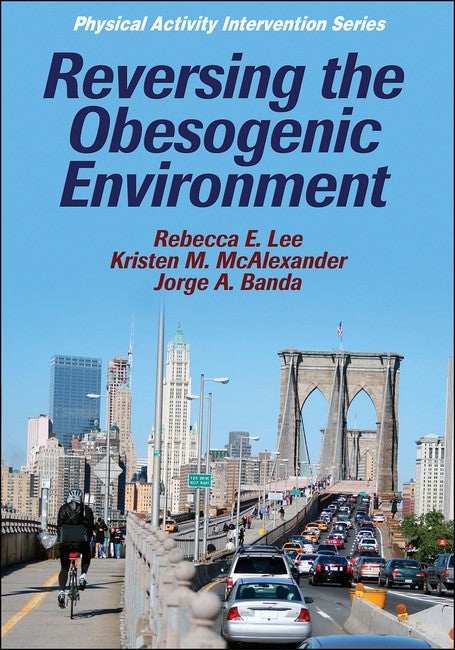Rebecca E. Lee, PhD, is the founding director of the Texas Obesity Research Center at the University of Houston. Lee is also an associate professor in the department of health and human performance at the University of Houston and holds a courtesy appointment at the University of Texas School of Public Health. She is a community health psychologist who has been principal investigator for numerous federally and privately funded research grants. Her studies have focused on interventions for populations of color, specifically interventions that incorporate social cohesion, ameliorate social injustices, and improve the quality of the neighborhood environment. Lee serves on the editorial boards of the International Journal of Women's Health, the American Journal of Health Promotion, and Health Psychology. She has served as a charter member of the community-level health promotion study section of the Center for Scientific Review at the National Institutes of Health and a member and former chair of the Mayor's Wellness Council Public Policy Committee, which works to improve the health of Houstonians. Dr. Lee is a fellow of the Society of Behavioral Medicine. She is a member of the Obesity Society and the International Society for Behavioral Nutrition and Physical Activity. She received the University of Houston College of Education Research Excellence Award in 2005 and 2008, and she has been recognized by the National Institutes of Health as a National Health Disparities Scholar. In 2009, her Saving Lives, Staying Active (SALSA) program was given the Outstanding Achievement for a Community Program Award by the Texas Council on Cardiovascular Disease and Stroke Kristen M. McAlexander, PhD, is a lecturer in the department of applied physiology and wellness at Southern Methodist University in Dallas, Texas. Dr. McAlexander's research interests include environmental and sociocultural influences of wellness behaviors and obesity, particularly among vulnerable populations such as women and low socioeconomic populations. McAlexander is also president and founder of Reflections Wellness, a local nonprofit organization designed to promote wellness while fighting local poverty and eliminating health disparities. Her research and nonprofit organization focus on understanding and reducing health disparities and improving wellness opportunities among underserved neighborhoods. McAlexander received a graduate research award and two graduate fellowships from the University of Houston department of health and human performance. McAlexander is an American Council on Exercise (ACE) certified personal trainer and a member of the Society for Behavioral Medicine, the American College of Sports Medicine, and the Urban Affairs Association. Jorge A. Banda, MS, is a PhD candidate in the department of exercise science at the University of South Carolina in Columbia and a research assistant at the university's Prevention Research Center. Banda holds a master's degree in exercise science from the University of Houston. His research has focused primarily on underserved populations, including low-income-housing residents, African-American and Latina women, and low-income rural communities. Banda received a Prevention Research Center Minority Health fellowship from the Association of Schools of Public Health and the Centers for Disease Control and Prevention, aand the Charles Coker Fellowship from the University of South Carolina. He was twice awarded a Norman Arnold School of Public Health fellowship. Banda also attended the Built Environment Assessment Training Institute sponsored by the U.S. Department of Agriculture, San Diego State University, and the University of Pennsylvania. He is a member of the American College of Sports Medicine and the American Public Health Association.
Request Academic Copy
Please copy the ISBN for submitting review copy form
Description
Part I: Public Health and Obesity Chapter 1: Emergence of the Obesogenic Environment Historical Emergence of Obesity as a Public Health Concern The Case for an Obesogenic Environment Ecologic Models of Health and the Importance of Supportive Environments Summary Chapter 2: Scope of Obesity Obesity Defined Causes of Obesity Vulnerable Populations Health Risks Associated With Overweight and Obesity Social and Psychological Costs of Obesity Summary Chapter 3: Body Composition Measurements Field Methods Laboratory Methods Summary Part II: Physical Activity and Obesity Chapter 4: The Built Environment Components of the Built Environment Measuring the Built Environment Limitations of Research on the Built Environment Neighborhood Walkability and Physical Activity Emerging Research and Recommendations Summary Chapter 5: Physical Activity Resources Parks and Open Spaces Walking Trails and Bikeways Home Environment Factors Influencing the Use of Physical Activity Resources Measuring Physical Activity Resources Emerging Research and Implications for the Future Summary Chapter 6: Active Transportation Personal Automobile and Obesity Walkability Public Transportation Active Transport to School Stair Use Summary Part III: Food Accessibility Chapter 7: Food Supply and Security Nutrition Transition Food Production Imports and Exports Food Storage Nutritional Disparities, Obesity, and Undernutrition Food Security Government intervention Supplemental Nutrition Assistance Program Summary Chapter 8: Food Technology Genetic Engineering Trans-Fatty Acids Factory Farming Summary Part IV: Public Policy, Sociocultural Influences, and Obesity Chapter 9: Policy and Individual Health Choices Levels of Preventions Guidelines Educating Individuals Regulations at the Point of Purchase Incentives for Good Behavior Other Approaches Summary Chapter 10: Policy and the Obesogenic Environment Agriculture International Trade Food Industry and Food Environments Built Environment Transportation Schools Worksites Summary Chapter 11: Cultural and Familial Influences Family Culture Within the Ecologic Model of Obesity Cultural Influences Familial Influences Summary Chapter 12: Social Justice, Health Disparities, and Obesity Socioeconomic Status SES, Social Injustices, Health Behaviors, and Obesity Weight Discrimination Resiliency to Social Injustices Solutions Summary Part V: Media and Marketing Chapter 13: Point of Purchase Marketing, Advertising, Branding The Four Ps Summary Chapter 14: Influence of Media and Technology Biological Responses to Food Images Television Advertising and Children Internet Advertising Billboard Advertising Sports Sponsorships Media Interventions Strategies Summary

